As the coronavirus pandemic, especially the second wave earlier this year, financially hurt the food and beverages (F&B) and hospitality sectors, luxury hotels went the extra mile to offer an unforgettable and royal experience to customers. Innovation became a buzzword as they tried to replicate the ambience of a five-star property and the services it offers. To ensure a broader reach, some even tied up with food aggregators such as Swiggy and Zomato, something they had not even considered before March 2020 when the virus brought with it long-lasting lockdowns and restrictions.
With room bookings—one of the most important streams of revenue for hotels—out of the equation during lockdowns, it was time to create newer and other steady avenues of income. “At the start of the pandemic, uncertainty loomed large. We had to change our priorities, plans and campaigns for the year. A lot changed. We explored and adopted several initiatives to drive non-room revenues," says Hemant Tenneti, senior director of operations, South Asia, Marriott International Inc.
Marriott International, for instance, rolled out the Marriott Bonvoy on Wheels in March 2020, a chauffeur-driven delivery service that made luxurious dining possible at home. Initially started in Mumbai and Delhi, it is now available in 80-plus hotels across India, including Tier II and III cities.
![]() Hotel also re-evaluated its menu and included more local and seasonal produce to solve supply challenges during the lockdown
Hotel also re-evaluated its menu and included more local and seasonal produce to solve supply challenges during the lockdown
“It has been one of our most successful non-room revenue options," says Tenneti. “Delivery penetration is a transformation that was projected to take years, but we have seen it happening in just a few months."
Home delivery has also been Hilton India’s most successful experiment during the pandemic. “We tied up with food delivery partners to be able to reach a wider audience. As this was a new territory for us, there was immense learning in the initial days. In Tier II cities such as Thiruvananthapuram, the online delivery business was a hit, especially during festivals such as Onam. The Sadhya meal was a success, with the hotel fulfilling as many as 300 orders a day," says Prashant Kulkarni, director of food and beverage operations.
The hotel also re-evaluated its menu and included more local and seasonal produce to solve supply challenges during the lockdown. “Menus that changed once a year were now changing with every season," adds Kulkarni. In addition, Hilton India developed ‘brunch in a box’ to replicate a brunch or a buffet spread one gets in hotels. To complete the experience, guests also got cocktail mixes delivered at home. Hilton India even offered an opportunity for guests to work from the hotel as restaurants or rooms were converted into workspaces with high-speed internet, an unlimited quota of tea and coffee, and meal packages to choose from. Virtual caterings also saw the light of day. The hotel designed a working lunch menu for corporates when they had day-long sessions and ensured it reached the team on time.
![]() Sofitel Mumbai BKC launched Do-It-Yourself kits and delivered high-end raw material such as cold cuts and exotic raw vegetables that weren’t easily available during the lockdown
Sofitel Mumbai BKC launched Do-It-Yourself kits and delivered high-end raw material such as cold cuts and exotic raw vegetables that weren’t easily available during the lockdown
Stung by the sudden lockdowns, Sofitel Mumbai BKC also began to have its food home-delivered to guests. This encouraged the team to set up a full-blown delivery service. “Initially, it was difficult to gauge demand for food delivery, but in the following months, we were delivering orders in good numbers and generating a decent revenue," says Akshay Sood, director of food and beverage.
![]() The hotel subsequently launched DIY (Do-It-Yourself) kits and celebration boxes. That apart, it began delivering high-end raw material that were not easily available. It also offered housekeeping services where professionals could clean homes and the hotel’s laundry services were open for public use for a fee.
The hotel subsequently launched DIY (Do-It-Yourself) kits and celebration boxes. That apart, it began delivering high-end raw material that were not easily available. It also offered housekeeping services where professionals could clean homes and the hotel’s laundry services were open for public use for a fee.
Buoyed by the response, Sofitel launched concepts such as ‘chefs-at-home’, ‘bartenders-at-home’, and engaged in bulk deliveries to facilitate virtual parties. “We would deliver 50 cakes across Mumbai for birthdays and anniversaries or party food boxes in the city. Families or friends would then connect on a video conferencing platform and enjoy meals together," says Sood.
It took a while for people to accept the new services, especially in Tier II and III cities, but they began warming up to them eventually. “At the beginning of the pandemic, we had a huge revenue loss after which we slowly started to pick up… since the quarantine business was doing good, it helped us with our top line," adds Sood.
Like Sofitel, The Lalit also introduced concepts such as chef-on-call and bartender-on-call. “These services were highly popular in metropolitan cities like Delhi and Mumbai," says Keshav Suri, executive director, The Lalit Group. The luxury hotel, informs Keshav, had partnered with delivery platforms much before the pandemic unlike its competitors. “We understood the trend of home-delivered food before it became the only option. We have always wanted to give our patrons the choice of, ‘Should we go out or order in?’," he says.
At Hyatt Hotels & Resorts, people had the option to curate their own dining experience or the choice to dine in their rooms, as it offered private dining services for small groups to make them feel safe.
Andaz Delhi, a luxury hotel under the Hyatt Group, on the other hand, paid attention to detail and shared it with its customers. “Delivery is a great model, but it requires the restaurant to have dishes that will give the guests an experience. Hence, we innovated the DIY kits, so that our guests are well informed of the quality of the artisanal products and know what they are eating and where it comes from, and do not simply view the meal as something to fill their stomach with," says Anum Ajani, marketing communications manager at Andaz Delhi. “For instance, in our menus, we also provide details about our sources, like Tijara Farms and Gayatri Farms. When we partnered with delivery platforms, we had to keep this in mind and tweak our menu to be delivery-oriented."
It was not just the luxury hotels, high-end luxury restaurants like Masque also suffered because of the shutdowns. To beat Covid blues, apart from curating menus for home deliveries, it introduced Milestones with Masque—a celebratory five-course tasting menu that guests could enjoy at home. It even experimented with a concept called Masque Tailgate, a drive-thru. “The idea was to turn our compound into a drive-thru, where guests could park at socially distanced spots and enjoy hot, fresh, quality food from the safety of their cars," says Aditi Dugar, founder, Masque, and Sage & Saffron, adding that they were sold out within the first three hours. “People were so frustrated with having spent a year at home… this gave them an opportunity to step out. It turned out to be such a resounding success that we continued the Tailgate every Sunday for another six months," she says.
![]()
Check-in or check-out?
Food delivery was never the core business for luxury hotels. It has always been about offering an experience within the four walls. “But when room revenue becomes zero or restricted, you have to put on your thinking cap to see how to generate revenue," says Kabir Suri, president of the National Restaurant Association of India (NRAI).
While continuing to maintain a relationship with their patrons was a by-product of the delivery business, it was business recovery that hotels were focussed on as the hospitality industry became one of the biggest casualties of the Covid-19 outbreak.
![]() The Taj Group of Hotels’ delivery platform Qmin introduced the Qmin Food Truck Service for those craving on-the-go meals and comfort food
The Taj Group of Hotels’ delivery platform Qmin introduced the Qmin Food Truck Service for those craving on-the-go meals and comfort food
“It is safe to say that these services have helped us gain a continuous revenue stream during these difficult times. In fact, it also gives us the inspiration to continue to test our capabilities and experiment with newer ideas," says Tenneti of Marriott International Inc. With good progress on vaccinations and relaxations on travel and tourism, demand is growing at a cautious pace for rooms and dine-ins. “Having said that, our food delivery numbers still show positive returns, and hence I am confident to say that this service is here to stay," he adds.
While hotels continued to tie up with food aggregators, some others launched their own applications. For instance, the Taj Group of Hotels started Qmin in June 2020. A year later, it is a business vertical that has its own lifestyle gourmet shop selling a variety of artisanal products, handpicked delicacies and a selection of coffees at President Hotel in Mumbai, and a Qmin Food Truck in the city too. “The launch of innovative brands such as the Qmin App, as a result of the growing demand for safe and premium food delivery services by our guests, has seen success in the past year," says Jehangir Press, commercial director, Qmin, IHCL.
![]()
Direct delivery is a model associations like the NRAI have encouraged patrons to follow. “Direct ordering means you know who your customer is and it allows them [hotels] to service their customers better according to their preferences and requirements. It brings them closer to the customer," says Suri of NRAI. Second, it helps them employ their own staff. “When staff was getting furloughed everywhere, models such as direct delivery helped keep staff employed. If you can’t serve within the premises, serve them outside became the motto," adds Suri. And most importantly, it helps hotels reduce costs to a great extent. “You have the staff, you have vehicles. Why do you need someone else to deliver for you?"
Sood of Sofitel agrees. While one of the biggest benefits of tying up with a food delivery partner is scaling up and generating significant revenues in an extremely lean period, the flipside is sharing part of the commission with them.
Through its direct delivery model, Qmin has serviced over one million customers in the first year. The food delivery platform caters to 18 cities from over 70 restaurants across 35 IHCL hotels in India. The deliveries contribute approximately 25 percent to the restaurant revenues. Press says they are hoping to expand to 25 cities in two years, signalling this is a trend that is here to stay.
![]() Luxury restaurant Masque introduced a drive-thru concept for guests to be able to enjoy hot, fresh, quality food from the safety of their cars
Luxury restaurant Masque introduced a drive-thru concept for guests to be able to enjoy hot, fresh, quality food from the safety of their cars
Chef Sanjeev Kapoor was among those who used Qmin. “The packaging was an experience in itself. It was delivered by the hotel staff and was dressed impeccably in a basket that was very fancy. For hotels like them, you can’t just sell food. You have to sell an experience, so everything about the basket spelt ‘luxury’," he says.
“People have gotten used to it… of getting served in the most luxurious manner at home. It will be difficult to do away with these trends. People have been deprived for far too long. The only way to rise is it continues."
Vineet Mishra, complex general manager, Pullman and Novotel Aerocity, New Delhi, agrees that restaurant footfall has definitely seen a rise and there is consistent improvement month-on-month. “However, food delivery and cloud kitchens are here to stay for some time. Currently, it is one of the biggest revenue streams for us. Diners reminisce the good old times of being able to dine out and are keen on recreating these luxury dining experiences at home," he says.
For the entire hospitality industry, it has been a tough and anxious time, but everyone is holding on to hope. “It’s going to be an uphill battle, but I am cautiously optimistic about what is to come, and hope to see an uptick in businesses like ours as we learn to balance the outcomes of the pandemic with the kind of future we want to build for ourselves," says Dugar of Masque.

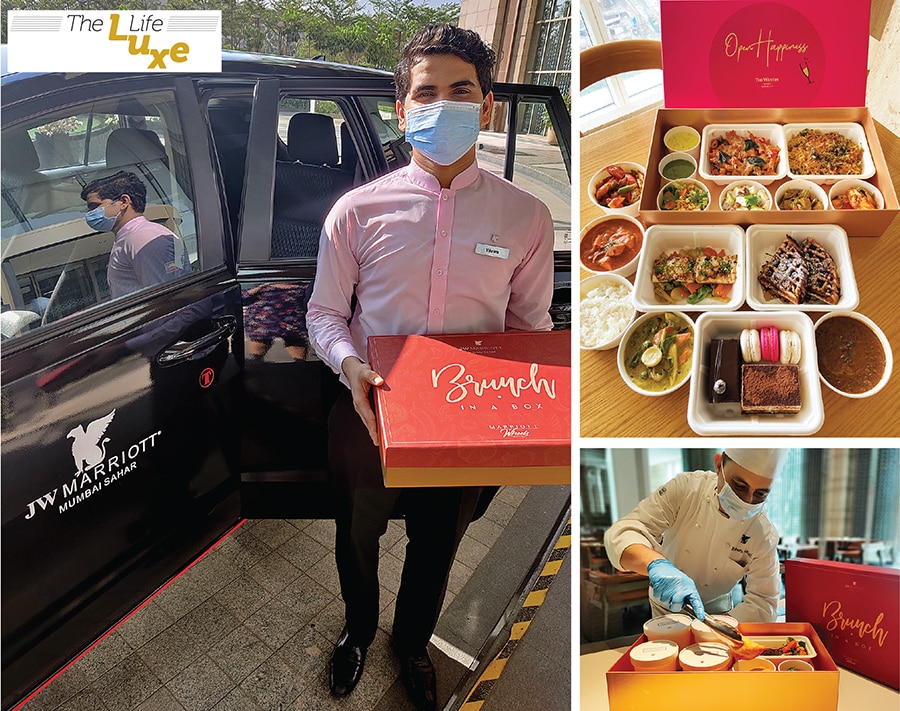 In March 2020, Marriott International Inc rolled out the Marriott Bonvoy on Wheels, a chauffeur-driven delivery service that makes luxurious dining possible at home. It eventually became the hotel’s most successful non-room revenue options
In March 2020, Marriott International Inc rolled out the Marriott Bonvoy on Wheels, a chauffeur-driven delivery service that makes luxurious dining possible at home. It eventually became the hotel’s most successful non-room revenue options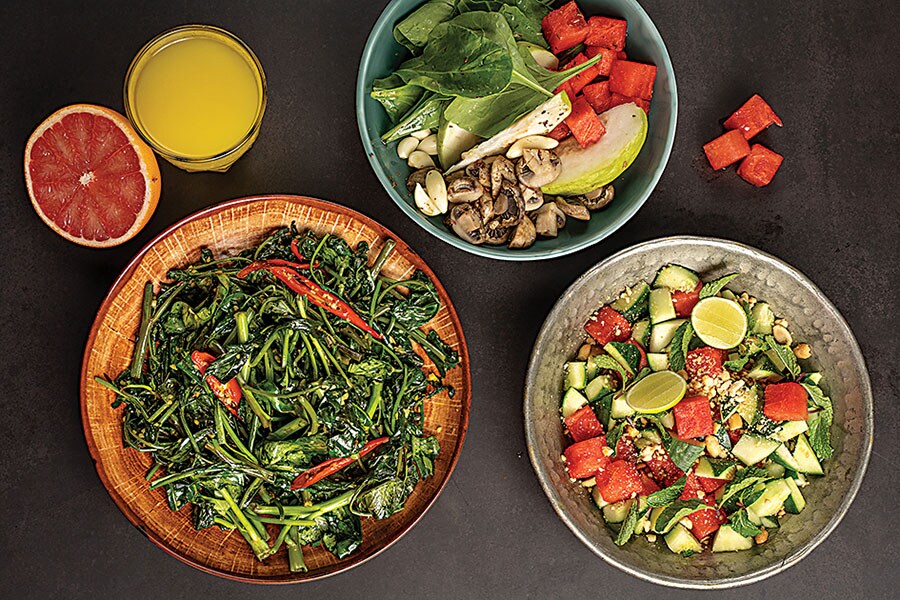 Hotel also re-evaluated its menu and included more local and seasonal produce to solve supply challenges during the lockdown
Hotel also re-evaluated its menu and included more local and seasonal produce to solve supply challenges during the lockdown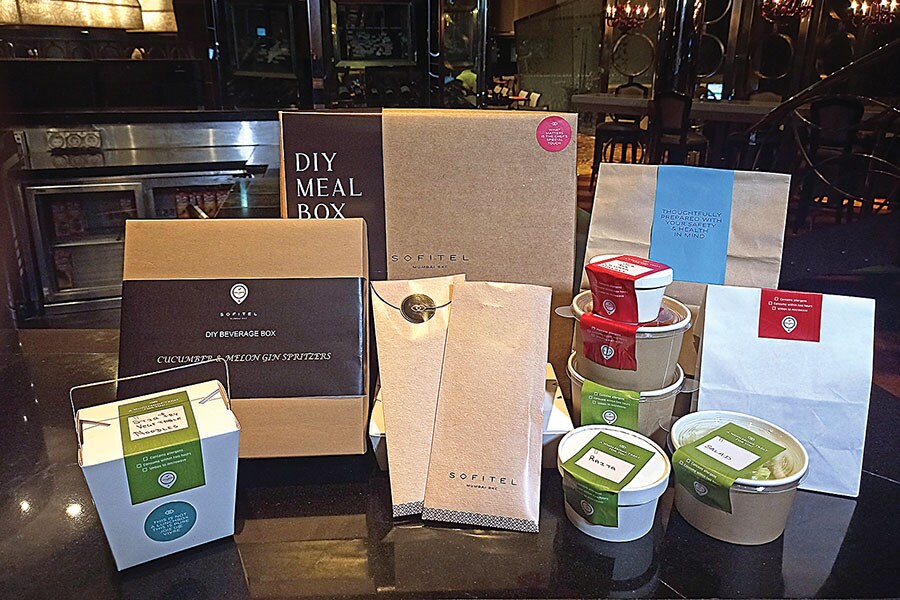 Sofitel Mumbai BKC launched Do-It-Yourself kits and delivered high-end raw material such as cold cuts and exotic raw vegetables that weren’t easily available during the lockdown
Sofitel Mumbai BKC launched Do-It-Yourself kits and delivered high-end raw material such as cold cuts and exotic raw vegetables that weren’t easily available during the lockdown The hotel subsequently launched DIY (Do-It-Yourself) kits and celebration boxes. That apart, it began delivering high-end raw material that were not easily available. It also offered housekeeping services where professionals could clean homes and the hotel’s laundry services were open for public use for a fee.
The hotel subsequently launched DIY (Do-It-Yourself) kits and celebration boxes. That apart, it began delivering high-end raw material that were not easily available. It also offered housekeeping services where professionals could clean homes and the hotel’s laundry services were open for public use for a fee.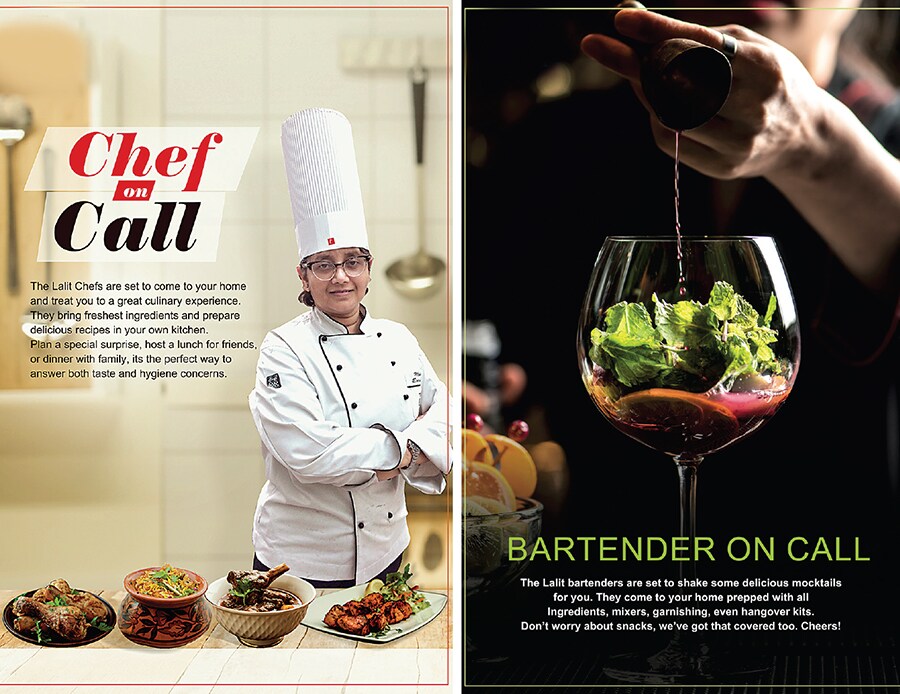
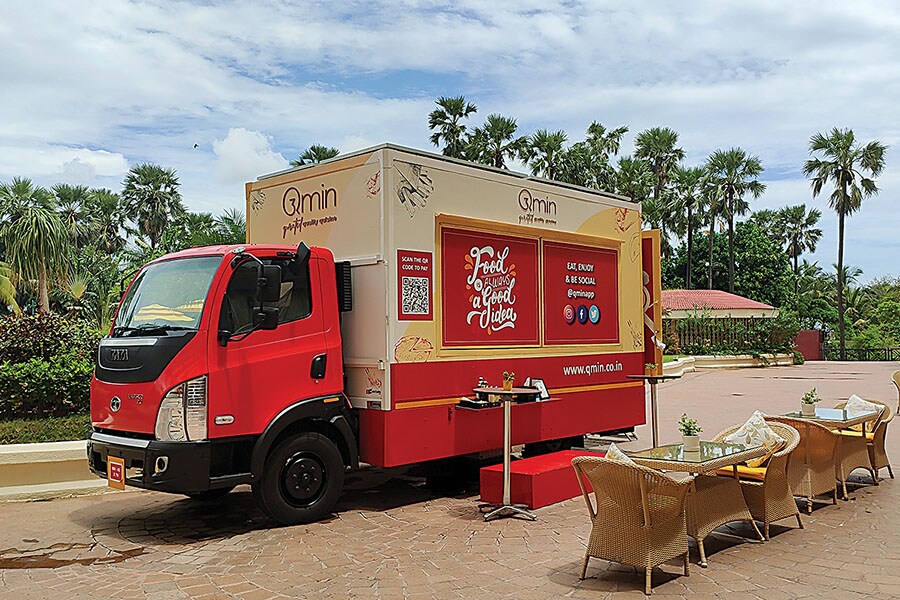 The Taj Group of Hotels’ delivery platform Qmin introduced the Qmin Food Truck Service for those craving on-the-go meals and comfort food
The Taj Group of Hotels’ delivery platform Qmin introduced the Qmin Food Truck Service for those craving on-the-go meals and comfort food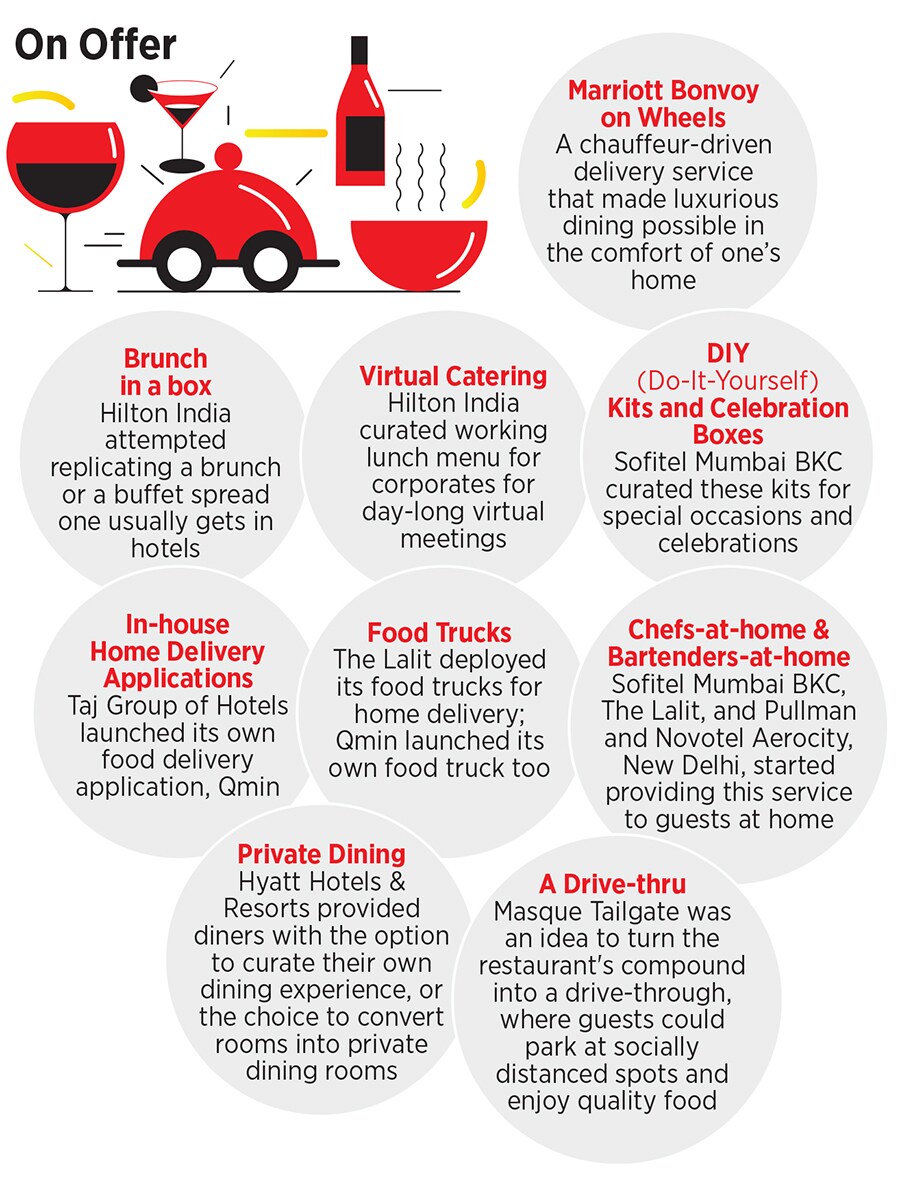
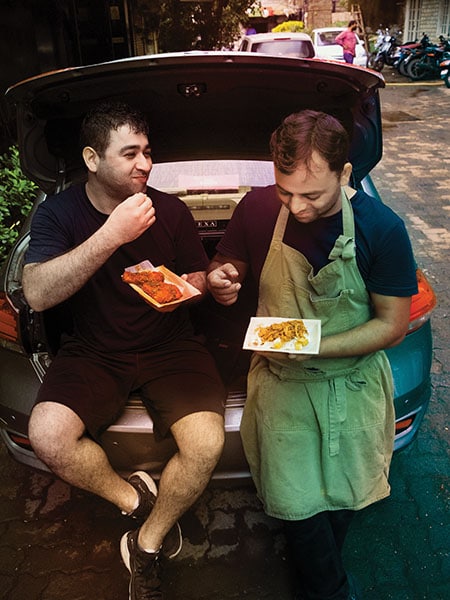 Luxury restaurant Masque introduced a drive-thru concept for guests to be able to enjoy hot, fresh, quality food from the safety of their cars
Luxury restaurant Masque introduced a drive-thru concept for guests to be able to enjoy hot, fresh, quality food from the safety of their cars